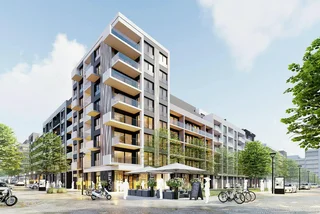Data from a Prague City Hall project shows that rental prices for apartments have dropped one-fifth during the coronavirus crisis, and the number of flats available has tripled, while use of flats for short-term rental has dropped by half. The city hopes to leverage this data to increase the number of flats going to long-term leases rather than shared use.
Analysts for Prague City Hall’s data platform Golemio have examined the coronavirus pandemic’s impact on the Prague real estate market. The analysis provides data that will allow the continuation of an informed discussion on the shared economy and shared housing, a City Hall press release stated.
Data for rentals came from the real estate portal Sreality.cz, and data related to Airbnb from the Blahobyty.cz server.
“I am pleased that our Golemio data platform has published another analysis on, among other things, short-term leases in Prague. We want as many of our decisions as possible to be based on hard data, especially if we are talking about providing short-term accommodation services that are actually based on data,” Prague Mayor Zdeněk Hřib (Pirates) said.
“Clear rules of the shared economy are a priority for us both at the Prague level and at the national level, especially with regard to the current situation affected by the coronavirus epidemic,” he added.
City Councilor Adam Zábranský (Pirates), responsible for housing and transparency, adds to the city want the flats to be used primarily for the purpose of long-term housing, because they were built for that purpose. “It is obvious that the provision of short-term accommodation in apartments has a negative impact on the availability of housing, at least in the wider city center,” he said.
“We will try to ensure that as many apartments as possible remain on the housing market in the long term and do not return to the accommodation services market. For example, we are creating a model of a social real estate agency, where the city will act as a partner for private apartment owners and will provide them with certain guarantees if they will be willing to rent apartments to those in need at affordable prices,” Zábranský added.
Based on the data on rentals and sales of real estate from the Sreality.cz portal and short-term accommodation via the Airbnb platform, a dashboard was created, which shows data on the number of new offers and the development of rental prices in Prague.
“It is obvious that Airbnb’s offers are no longer increasing. On the contrary, vacant apartments and houses that were previously leased via Airbnb are already moving to conventional leases. For example, in Prague 1, fewer than 100 new rental offers per week were added in January and February; at the turn of March and April, this number climbed to 309 new rental offers in one week,” Golemia data analyst Martina Paříková said.
The analysis of Sreality.cz data also shows that the median price of new apartment rentals in the week from April 13, 2020, for example, decreased by 20% compared to the last week of February in Prague 1. The rental price from 388 CZK per square meter fell to 309 CZK per square meter. As for short-term rentals via Airbnb, there were 15,000 stays in Prague in March this year, which is fewer than half of March last year, when 32,000 stays were made.
Travel restrictions began in the middle of March, blocking most foreigners from entering the country. Stay-at-home orders discouraged domestic tourism.
The data platform is one of the Smart Prague concept’s six main areas until 2030, City Hall said. “The Smart City is above all a human-friendly city for us, and we believe that the use of new technologies in the urban environment should primarily serve Prague residents. Therefore, we perceive the data platform as the heart of smart Prague, which draws on and combines available city data, but also provides it further and enriches it with clear visualizations and analyzes,” Michal Fišer, CEO of Operátor ICT, which includes Smart Prague projects such as the Golemio data platform.
“These serve not only the general public, the media, academics and developers, but also significantly those who decide on the future of the city,” he added.
The Golemia website contains more data on the impact of the coronavirus and other aspects of life in prague such as traffic, public transit, energy use, air quality and waste management.












 Reading time: 3 minutes
Reading time: 3 minutes 

























